481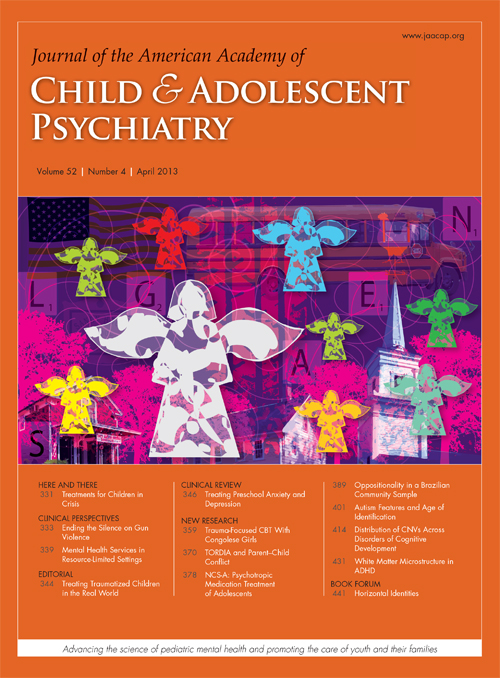
Apr 18, 2018
Overgaard, Kristin Romvig et al. Journal of the American Academy of Child & Adolescent Psychiatry , Published online April 2018
This study was undertaken as part of the Norwegian Mother and Child Cohort Study (MoBa). Parents and preschool teachers rated a total of 238 girls and 276 boys (mean age 3 ½ years) with the Strengths and Difficulties Questionnaire (SDQ) HI subscale. The parental SDQ HI subscale was useful for screening for ADHD in preschool girls and boys (area under the curve ...
482
Apr 18, 2018
Hui CLM, Honer W, Lee E, et al. The Lancet Psychiatry , Published online April 2018.
This paper describes a ten-year follow-up study of a randomised controlled trial from seven centres in Hong Kong in which 178 patients with first-episode psychosis with full positive symptom resolution after at least 1 year of antipsychotic treatment were given maintenance treatment (n=89; oral quetiapine 400 mg daily) or early treatment discontinuation (n=89; placebo) for 12 months. After the trial, patients...
483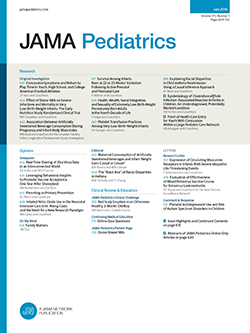
Apr 18, 2018
Narad ME, Kennelly M, Zhang N, et al. JAMA Pediatr. Published online March 19, 2018. doi:10.1001/jamapediatrics.2017.5746
This comparison of 187 children with severe traumatic brain injury (TBI) and children with orthopaedic injuries demonstrated that TBI is associated with an increased risk of later ADHD (hazard ration 3.63 (1.59-8.26), especially if low levels of maternal education and family dysfunction were present.
https://jamanetwork.com/journals/jamapediatrics/article-abstract/2675...
484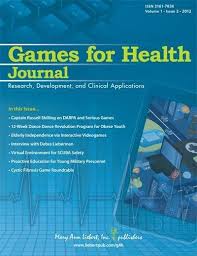
Apr 18, 2018
Viliani D, Carissoli C, Trierti S, et al. Games for Health Journal. Published online April 2018. http://doi.org/10.1089/g4h.2017.0108
This systematic review of 23 studies examining the effects of videogames for emotional regulation found that playing videogames may enhance emotional intelligence and the mastery of emotional regulation strategies. However, excessive videogame playing may negatively influence such competencies.
https://www.liebertpub.com/doi/10.1089/g4h.2017.0108?utm_source=...
485
Mar 15, 2018
Madigan S, Ly A, Rash CL, Van Ouytsel J, Temple JR. JAMA Pediatr. Published online February 26, 2018. doi:10.1001/jamapediatrics.2017.5314
This systematic review of 39 studies involving over 110,000 participants found that the mean prevalence for sending and receiving ‘sexts’ was 14.8% and 27.4% respectively, with the prevalence increasing with age and over time. The prevalence of forwarding and receiving a sext without consent was 12% and 8.4%. These figures demonstrate that sexting...
486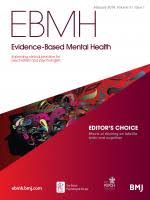
Mar 15, 2018
Aggarwal S, Patton G. Evidence-Based Mental Health 2018;21:16-22. http://dx.doi.org/10.1136/eb-2017-102791
This review of ten studies found that the effectiveness of family-based interventions in reducing adolescent self-harm, suicidal ideation and suicide attempts was related to the duration of such interventions. Brief interventions were less effective than those of intermediate duration. Longer interventions such as dialectical behaviour therapy and multi-systemic therapy were revealed...
487
Mar 15, 2018
Cottrell, David J et al. The Lancet Psychiatry 2018. Volume 5 , Issue 3 , 203 - 216
In keeping with the review by Aggarwal and colleagues (Evidence Based Mental Health 2018), this large randomised controlled trial undertaken across 40 sites showed that brief/intermittent family therapy did not add anything to usual care for the treatment of young people with self-harm. Family-based interventions probably need to form a substantial part of care if they are to make a difference to outcomes for ...
488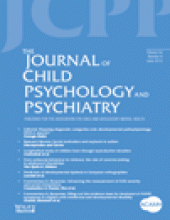
Mar 15, 2018
Priel, A., Djalovski, A., Zagoory-Sharon, O. and Feldman, R. J Child Psychol Psychiatry 2018. doi:10.1111/jcpp.12880
Maternal sensitivity is already known to mediate the relationship between maternal depression and childhood mental illness. Now it seems that a child’s oxytocin level may also alter their likelihood of developing mental illness if their mother had depression during their first year of life.
http://onlinelibrary.wiley.com/doi/10.1111/jcpp.12880/abstract?campaign=wolearlyvie...
489
Mar 15, 2018
Chatoor, I., Hommel, S., Sechi, C. and Lucarelli, L. Infant Ment. Health J 2018., 39: 153–169. doi:10.1002/imhj.21702
This new scale can be used with children aged between 1 month and 3 years to evaluate the quality of the parent-child relationship. It has four subscales – dyadic reciprocity, maternal unresponsiveness to infant/toddler cues, dyadic conflict and maternal intrusiveness and may discriminate between children with different types of DC 0-3 feeding disorders.
http://onlineli...
490
Mar 15, 2018
Fuller C, Lehman E, Hicks S, et al. Global Pediatric Health 2017. https://doi.org/10.1177/2333794X17736972
This is a useful article to give parents who ask about the impact of bedtime use of technology on children’s behaviour. Children who use one form of technology at bedtime are more likely to use multiple forms of technology, to experience less sleep, more morning tiredness and more obesity, but not greater levels of inattention.
http://journals.sagepub.com/doi/full/10.1177/2333794X17...









